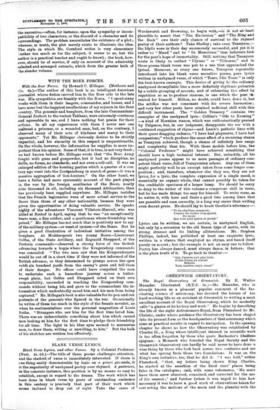WITH THE BOER FORCES.
With the Boer Forces. By Howard C. Hillegas. (Methuen and Co. 6s.)—The author of this book is an intelligent American journalist whose duties carried him to the Boer side in the late war. His sympathies are frankly with the thers. "I spent many weeks with them in their laagers, commandos, and homes, and I have none but the happiest recollections of my sojourn in the Boer country. The generals and burghers, from the late Commandant- General Joubert to the veriest Takhaar, were extremely courteous and agreeable to me, and I have nothing but praise for their actions. In all my experiences with them I never saw one maltreat a prisoner, or a wounded man, but, on the contrary, I observed many of their acts of kindness and mercy to their opponents." Yet Mr. Hillegas obviously desires to be strictly impartial, and his sincerity in this respect is unquestionable. On the whole, however, the information he supplies is more im- portant than his opinion. Some of that, it is true, is not very fresh ; we bad known before Mr. Hillegas wrote that "the Boer Army fought with guns and gunpowder, but it had no discipline, no drills, no forms, no standards, and not even a roll-call. It was an enlarged edition of the hunting parties which a quarter of a cen- tury ago went into the Zoutpansberg in search of game—it was a massive aggregation of lion-hunters." On the other hand, we have a fuller and more systematic account of the part played in the war by the foreign auxiliaries of the Boers, nearly nine thousand in all, including six thousand Afrikanders, than has previously been supplied anywhere. Mr. Hillegas testifies that the French legionaries were of more actual service to the Boers than those of any other nationality, because they were given the opportunities of doing valuable service. He speaks highly of the adventurer Viscount Villebois-Mareuil, who was killed at Boshof in April, saying that he was "an exceptionally brave man, a fine soldier, and a gentleman whose friendship was prized." Mr. Hillegas has not much that is positively new to say of the military system—or want of system—of the Boers. But he gives a good illustration of indiviidual initiative among the burghers. At Modderspruit two young Boers—Lieutenant Oelfse, of the State Artillery, and Reginald Sheppard, of the Pretoria commando—observed a strong force of the British advancing towards a kopje where the Krugersdorp commando was concealed. "The two men saw that the Krugersdoruers would be cut off in a short time if they were not informed of the British advance, so they determined to plunge across the open veldt six hundred yards from the enemy's guns and tell them of their danger. No officer could have compelled the men to undertake such a hazardous journey across a bullet- swept plain, but Oelfse and Sheppard acted on their own responsibility, succeeded in reaching the Krugersdorp com- mando without being hit, and gave to the commandant the in- formation which undoubtedly saved him and his men from being captured." Mr. Hillega.s's book is also valuable for its pen-and-ink portraits of the generals who figured in the war. Occasionally he writes of them too much in the style of the female novelist, as when he sentimentalises over the personal magnetism of Louis Botha. "Strangers veho saw him for the first time loved him. There was an indescribable something about him which caused men looking at him for the first time to pledge their friendship for all time. The light in his blue eyes seemed to mesmerise men, to draw them, willing or unwilling, to him.' But the bulk of his sketches are written less effusively.






















































 Previous page
Previous page